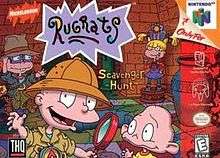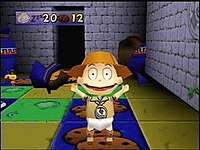Rugrats: Scavenger Hunt
Rugrats: Scavenger Hunt is an interactive board video game developed by Realtime Associates for the Nintendo 64. It was published by THQ in 1999.[1] The game is based on the animated television series Rugrats and features the original voices from the Rugrats cast.
| Rugrats: Scavenger Hunt | |
|---|---|
 North American cover art | |
| Developer(s) | Realtime Associates |
| Publisher(s) | THQ |
| Composer(s) | Mark Mothersbaugh |
| Platform(s) | Nintendo 64 |
| Release | |
| Genre(s) | Board game |
| Mode(s) | Single-player, multiplayer |
The game features three game boards: Angelica's Temple of Gloom, which has an Aztec setting; Pirate Treasure Hunt, where the babies scuba dive under water to find hidden treasure near a sunken ship; and Reptar Rally, which is the only stage that changes the babies into dinosaurs, resembling the form of Reptar.
Gameplay
The opening cutscene shows Didi Pickles, Grandpa Lou, Tommy Pickles, and Chuckie Finster in the Pickles home. Didi is setting up a board game and leaves Grandpa to read the rules while she makes popcorn. Grandpa reads the directions, then falls asleep. Tommy and Chuckie are confused on what a "boring game" is, thinking the winner must make everyone bored, when Angelica Pickles comes in and corrects them, saying it is a "board game", as the game is on a board. Grandpa wakes up and continues reading the rules, saying things must be decided before playing. This leads to the setup screen.
Players control one of four babies including Tommy, Chuckie, Phil, and Lil. The main goal is to collect the most of a specific item. Stages usually begin with a brief cut scene to explain what needs to be collected, then the game begins. Items can be gathered after landing on the "Search" space, which can be recognized by the magnifying glass design. Searching may lead players to find only a dust bunny, a dud item with no function, but it is the only way to acquire certain items. If a player finds the "Double Search Power" tool when searching, he/she may search twice every turn. Dil Pickles, Tommy's brother, appears when a player stops on a "Mystery" space, driving the Reptar Wagon and changing the identity of the spaces on the board. There is a hidden square option that can be turned on or off at the start screen.
Players can collect cookies, toy cards, and energy. Cookies are a form of currency that may provide opportunities for special bonuses. Susie (only on the Pirate Treasue Hunt board), Tommy's dog Spike, and Grandpa serve as allies doing various tasks such as giving players extra cookies when they come in contact with them. Toy cards give players special abilities. One lets players turn into Reptar and travel up to five squares and stop anywhere they like, which can only be achieved normally when a "Set Spin" is selected randomly from the spinner. Toy cards can be purchased if one lands on a toy card space; which if used wisely, can stretch the limits of game play for a single turn. Energy is needed to move from one space to another in all boards excluding Reptar Rally. If one runs out of energy, they will warp to a "Bedroom" where the player can warp to any of the main rooms instantly. There are also spaces for recovering different sleep amounts.
Game boards

There are three different game boards. Angelica's Temple of Gloom has an Aztec setting, and is the only one of the three boards that is played cooperatively. Stu Pickles brings home statues that Angelica accidentally shatters. The babies must recover all of the missing statue pieces (four times the number of active players) before Angelica finds hers to win. Angelica serves as the main antagonist during the Temple of Gloom board, trying to snatch items in question before the others. She also may take away items from other players if they come in contact with her. The story of this game board begins when Stu comes in with a set of expensive replica Aztec statue pieces before being called away by Didi. Grandpa begins to tell the babies a story about exploring ancient Aztec ruins and coming to the Temple of Cokabowla before falling asleep. Angelica tells the babies the replicas are cursed and they would be sorry if they were to break, before accidentally breaking all of the statues onto the board. A voiceover says the players must find their statue pieces first, before Angelica finds the pieces to her statue-or they will be trapped in the Temple of Cokabowla forever. If Angelica finds all her pieces first, Stu comes in to find the statues broken. Angelica pins blame on the babies, and the Rugrats gang are sent to their cribs. Angelica looks to the audience and laughs, saying grown ups will believe anything. If the babies find all their pieces first, Stu comes in to find the statues broken. Angelica says it wasn't her and leaves the room. The babies celebrate their win, saying they lifted the curse.
Pirate Treasure Hunt involves the babies scuba diving under water to find hidden treasure near a sunken ship. After Stu shows the babies his replica of a pirate ship, Grandpa Lou tells a story about pirates with treasure. They must find all four kinds of "pirate treasure" to win.
Reptar Rally is the only stage that changes the babies into dinosaurs, resembling the form of Reptar. Here they collect different types of candy on an island made of sweets. If they successfully collect candy from everyone else's stash, they win.
Development
In 1997, THQ signed an agreement with Nickelodeon to develop and publish video games using the Rugrats license through December 2002. The deal gave THQ exclusive rights to Rugrats for all current and future game systems from Nintendo, Sony and Sega.[2] Among the first projects announced as resulting from this deal was an as-yet untitled Nintendo 64 game scheduled for release in 1999.[3][4] Rugrats: Scavenger Hunt was originally shown at THQ's booth at the 1999 Electronic Entertainment Expo.[1] Mark Mothersbaugh composed the game's music.[5]
Reception
| Reception | ||||||||||||
|---|---|---|---|---|---|---|---|---|---|---|---|---|
| ||||||||||||
Turhan Herder of IGN called Rugrats: Scavenger Hunt "a dull, sloppy mess which not only embarrasses everyone involved but manages to tarnish the very license it meant to exploit." Herder said that "young children will quickly be bored from the slow pace and frustrated by the unintuitive game mechanics, while more experienced gamers will balk at the simplistic play and juvenile subject matter." Herder commented that the game "is yet another example of a publisher trying to make a quick buck off a popular license."[7] The Electric Playground criticized the game's simplicity and stated that it would only appeal to players under the age of seven.[9]
References
- "Rugrats: Scavenger Hunt". IGN. May 14, 1999. Retrieved July 3, 2011.
- "THQ Inks Rugrats Agreement". IGN. February 16, 1999. Retrieved July 3, 2011.
- "Rugrats Crawl to Console". Electronic Gaming Monthly. No. 102. Ziff Davis. January 1998. p. 22.
- "THQ Sweeps Up Rugrats". IGN. October 9, 1997. Retrieved 14 May 2020.
- "Rugrats: Scavenger Hunt - Credits". AllGame. Archived from the original on November 15, 2014.
- Baize, Anthony. "Rugrats: Scavenger Hunt - Review". AllGame. Archived from the original on 2014-11-15. Retrieved 2014-12-13.
- Herder, Turhan (1999-07-06). "Rugrats: Scavenger Hunt". IGN. Retrieved 2014-03-14.
- "Rugrats: Scavenger Hunt". Nintendo Power. 122: 116. July 1999.
- "Rugrats: Scavenger Hunt". The Electric Playground. Archived from the original on 2001-02-19. Retrieved 2018-05-16.